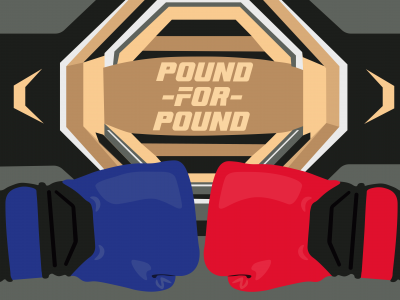While UFC Fight Night: Royval vs. Taira saw two elite flyweights put on an amazing main-event fight Oct. 12, Sal D’Amato’s poor judging loomed over the card.

In three of his four judging assignments, including the main event, D’Amato was responsible for split decision dissents, meaning he was the sole judge to rule the win to one fighter, even if the other two judges thought the other fighter won.
In all three cases, the fans — myself included — could not fathom these decisions. Not only did D’Amato go against other judges’ rulings, but he consistently gave wins to the fighter who tallied fewer significant strikes.
In the main event, Tatsuro Taira performed well, but he clearly –– and I mean clearly –– did not win the first round or the fight as a whole. D’Amato scored the first round to Taira, and ruled that he won the fight 48-47.
He also ruled that Alex Morono defeated Daniel Rodriguez in a fight where Rodriguez landed double Morono’s significant strikes in the second and third rounds.
His final poor call went against the other judges in Cory McKenna’s loss to Julia Polastri. He ruled McKenna won 29-28, but Polastri outstruck McKenna in every round.
D’Amato’s past decisions
I did some research into D’Amato’s past decisions, and while some terrible calls stand out, he has been on the correct end of a few in the past.
In my opinion, his worst call was giving Amir Albazi the win over Kai Kara-France back in 2023, where almost 90% of fans saw it as a 49-46 or 48-47 win for Kara-France. No one expected Albazi to win. Regardless, D’Amato and Chris Lee gave the fight to Albazi, 48-47.
In June 2024, D’amato ruled that Nasrat Haqparast defeated Jared Gordon in a fight that both fans and media members thought Gordon won, but did not due to the wayward judging.
However, D’Amato has made some good decisions in the past. Most notably, he ruled that Sean Strickland defeated Dricus Du Plessis at UFC 297. In one of the most controversial fights of the year, Du Plessis won by split decision, but many fans would agree with D’Amato’s decision.
In another fight involving Sean Strickland, D’Amato scored Strickland’s 2022 fight with Jared Cannonier a 49-46 win for Strickland.
In one of the closest fights ever put on, two judges scored the card opposite from D’Amato. Some UFC fans called for D’Amato’s banishment after Taira’s fight with Royval. While that is unlikely, UFC 305 saw a judge replaced mid-event after a poor decision.
The main argument is that the rules for judging must be clearer. The debate between control time and striking has long been a point of disagreement among fans. What should win someone a fight? Should the judges rule four minutes of control time as a round to the controlling fighter, even if they were clearly outstruck on the feet in the remaining minute?
The Unified Rules of Mixed Martial Arts is of little use in this case. It only states that effective striking and grappling should be used to score each round, but not which one takes precedence over the other.
Because of this, many people have taken issue with the scoring of recent fights: José Aldo’s loss to Mario Bautista, Alexa Grasso’s draw with Valentina Shevchenko and the aforementioned Albazi vs. Kara-France bout. These fights usually involve scenarios where one fighter dominates the striking and the other does little in terms of grappling besides control time.
The power the judges possess cannot be overlooked, as one poor scorecard can completely change the makeup of the sport. If the rules aren’t clarified, the judges can continue to influence the sport in ways they shouldn’t be able to.
What can be done about it?
Again, a checks and balances system can push for a judge’s removal mid-event. We all have off nights, but the implications are too great with poor judging.
I would also enjoy seeing a change in the scoring itself. Right now, the primary possibilities for scoring are 10-9 and 10-8, with a 10-10 and 10-7 being possible, but very rarely seen. However, the score is up to the judge’s discretion, and they will all have different interpretations of how the round should be scored. In my opinion, the scoring system is too limited right now.
What if a round is razor-close, but the judges don’t want to award a 10-10? Then, they must give the close round a 10-9. What if a round verges on complete dominance, but the judges don’t want to award a 10-8? The judges must award a 10-9.
The 10-9 round is too big of a spectrum to judge rounds on. While I don’t think the scoring system should change entirely, and the increased use of the 10-10 would result in many more draws, I think there must be some specification to the scoring criteria or change in the scoring system.
Without this, we will continue to see poor judging decisions that alter the landscape of the UFC — all because of a bad judgment call.


















































































































